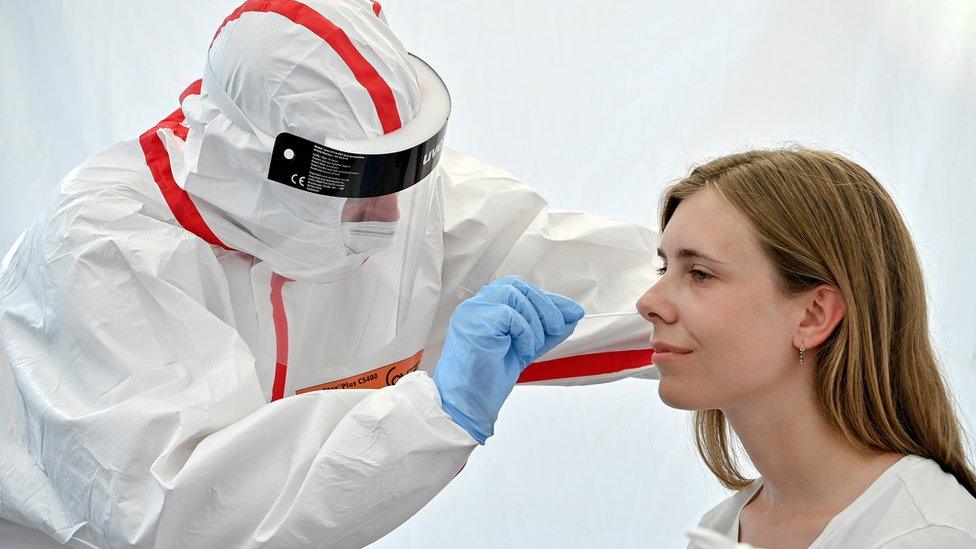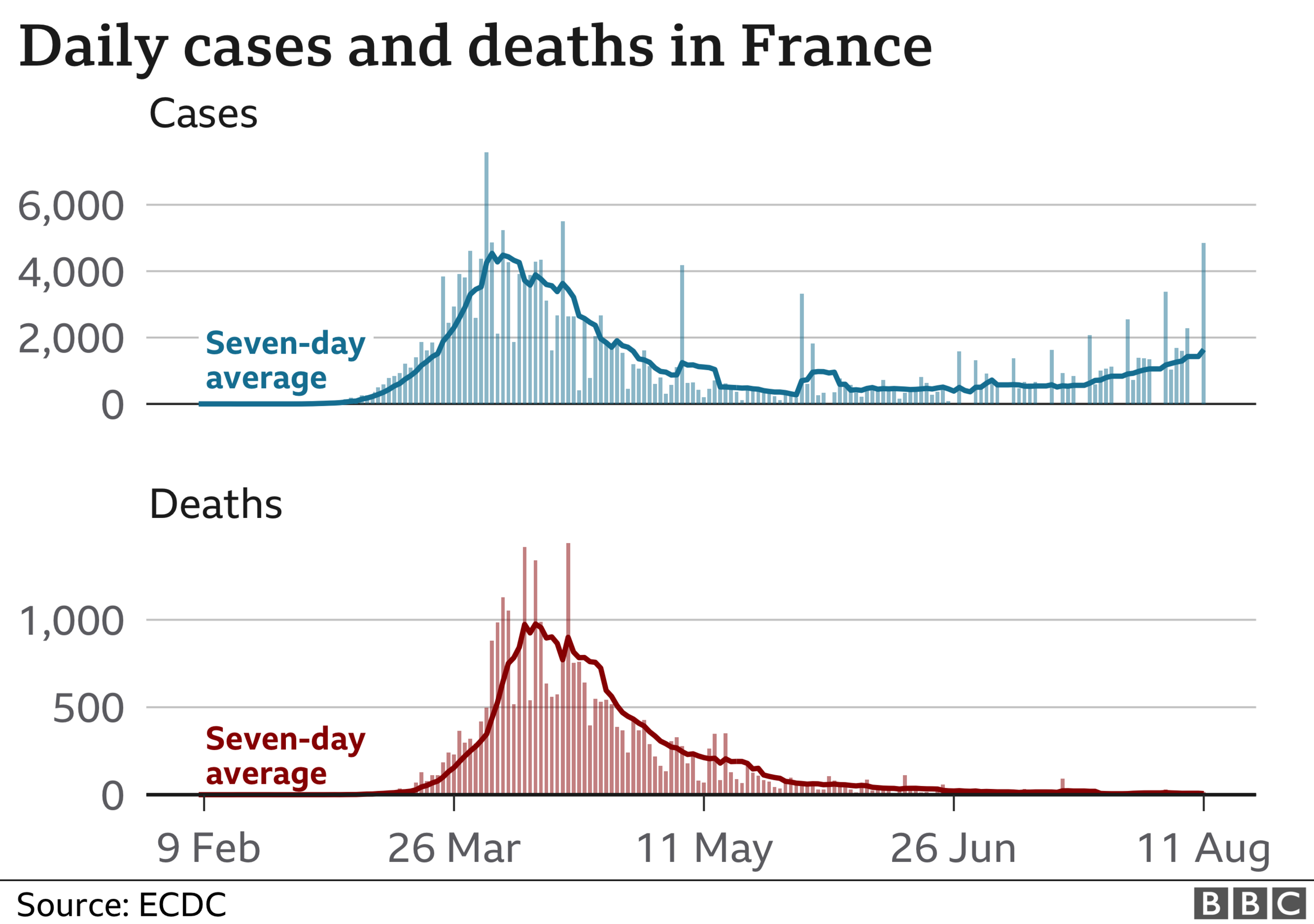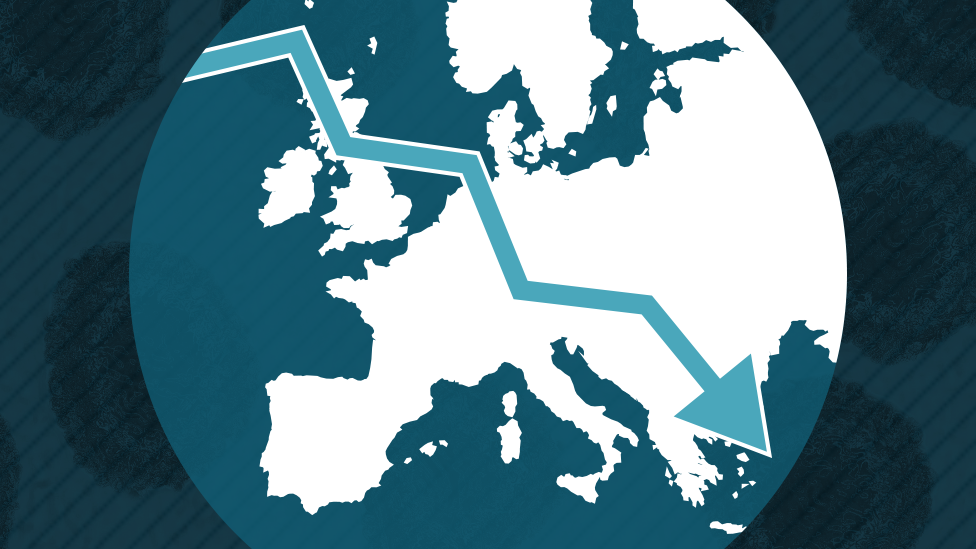Coronavirus in Europe: Infections surge in France, Germany and Spain
- Published

Germany has recorded its biggest daily increase in coronavirus cases in more than three months
Germany has recorded its biggest daily increase in coronavirus cases in more than three months as European countries struggle to curb a surge in infections.
More than 1,200 cases were reported in Germany in the past 24 hours. Officials said the rise was due, in part, to people returning from holidays.
It came as Germany warned against non-essential trips to parts of Spain.
Meanwhile, France had 2,524 new cases in 24 hours, the highest daily rise since its lockdown was lifted in May.
The German foreign ministry said it had added a partial travel warning to the Spanish capital Madrid and the Basque region on Tuesday amid rising infections there. Warnings were already in place for the regions of Aragon, Catalonia and Navarra.
Germany has recorded more than 9,000 coronavirus-related deaths since the pandemic began.
A 'critical moment' for Spain
Spain is facing the worst coronavirus infection rate in Western Europe. It recorded 1,418 new infections in its latest daily count on Tuesday and said there were 675 "active outbreaks" in the country.
Salvador Macip, an expert in health sciences at Catalonia's Open University, told AFP news agency the country was at a "critical moment".
"We are right at a point where things can get better or worse. This means we have to pull out all the stops to curb outbreaks before they become more serious," he said.
In total, Spain has recorded more than 326,000 cases - the highest number in Western Europe and the 11th highest in the world.
Mask-wearing compulsory in Brussels
Wearing a face mask became compulsory in all public areas in Brussels on Wednesday amid a rise in cases.
The order applies to those aged 12 and above. People were previously only required to wear masks in crowded public spaces and enclosed areas of the Belgian capital, such as shopping centres.
Authorities said the enhanced rules were introduced because of a rise in infections, with Brussels recording an average of 50 new cases per 100,000 inhabitants per day over the past week.
Police checks are being ramped up to ensure that people follow the new rules.
The mask-wearing regulation is one of the strictest currently in place in Europe.
Belgium has recorded more than 75,000 cases of coronavirus and more than 9,800 deaths, according to data collated by Johns Hopkins University.
Paris cancels rescheduled marathon
This year's Paris marathon has been cancelled as France battles a spike in coronavirus cases, organisers said on Wednesday.
The marathon was originally due to take place on 5 April but was then postponed to 15 November because of the pandemic.
Organisers said they had "tried everything to maintain the event" but felt "obliged" to call it off.
"There will be great disappointment among those who have sacrificed time training for what had become an autumn marathon," they said.
Organisers are now working on the 2021 marathon.


The announcement came after Paris became the latest French city to make face masks compulsory in busy outdoor areas. Face masks were already compulsory nationwide in enclosed public spaces.
A government spokesman on Wednesday said France would gradually ramp up police checks to ensure that people were respecting social distancing and wearing masks where required.
"We're at a tipping point... We're going to mobilise polices forces to make checks," Gabriel Attal told journalists.
France has now recorded a total of 206,696 cases of the virus.
Greece records its highest daily rise
On Wednesday Greece reported 262 new cases of coronavirus, its highest daily tally since the start of the pandemic.
The country has now had 216 deaths and 6,177 cases in total.
As a result of the increase in infections in recent weeks, authorities have introduced a curfew for restaurants and bars in some of the country's top tourist destinations - despite this being the peak of the tourism season.
They have also enforced restrictions on arrivals from several EU countries and Balkans nations.

A SIMPLE GUIDE: How do I protect myself?
IMPACT: What the virus does to the body
COMPARING COUNTRIES: Why it is not straightforward
GLOBAL SPREAD: Tracking the pandemic

- Published5 July 2022

- Published25 June 2021
